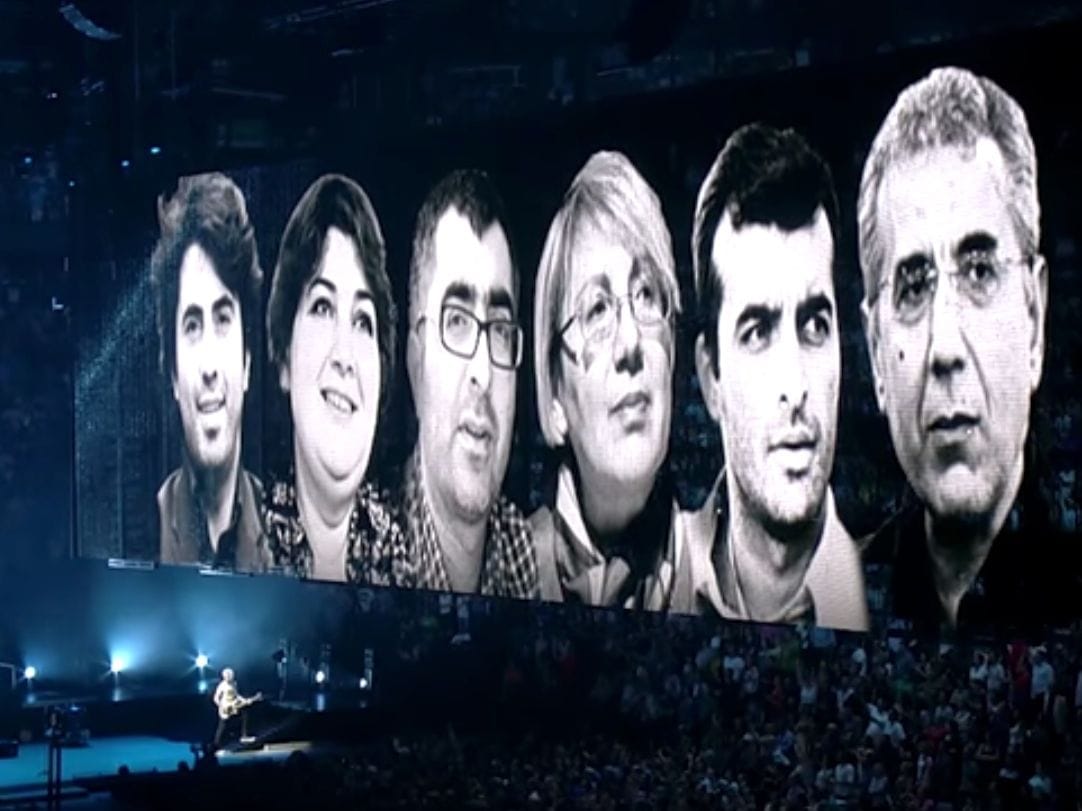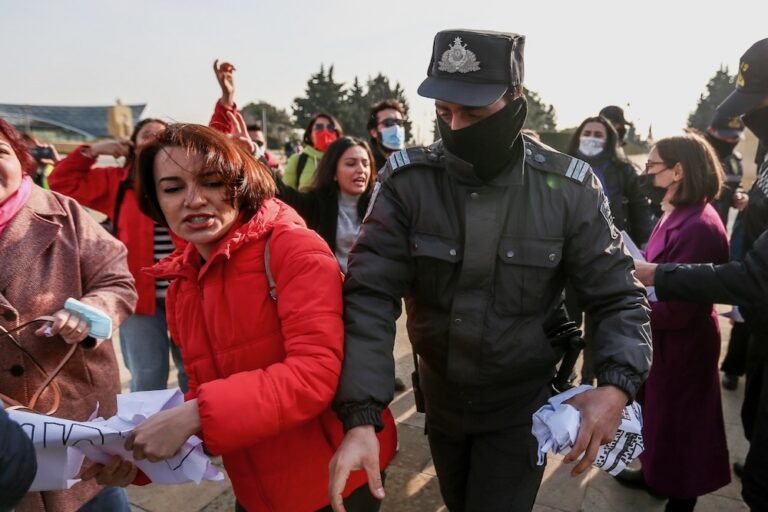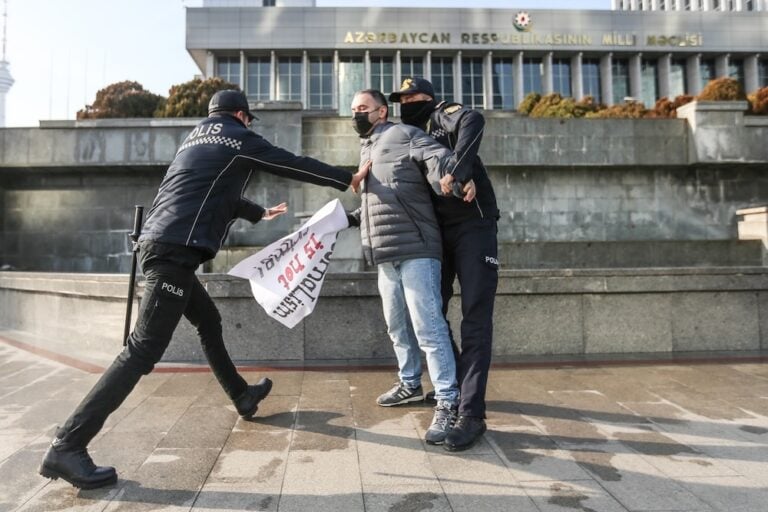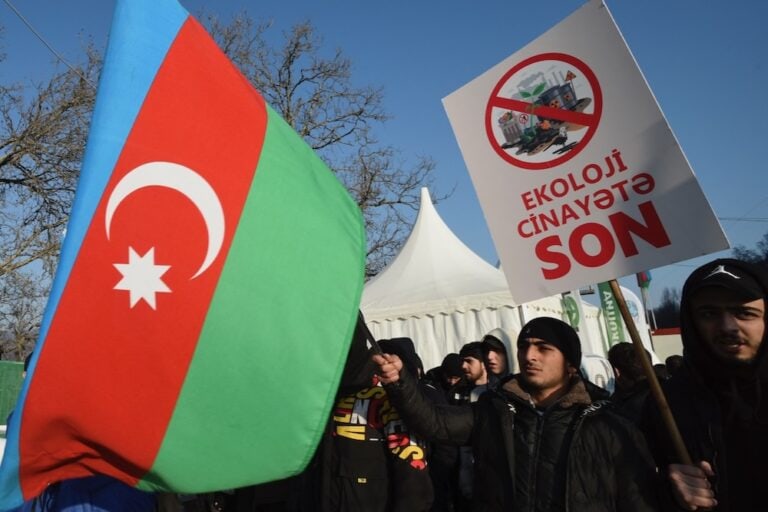Between the highjacking of the #Baku2015 hashtag on Twitter, John Oliver's hilarious critique of the games, and U2 appealing to audience members to stand with Azerbaijan's political prisoners, non-athletes around the world have managed to turn the European Games on its head.
“I think now we need more global change in sports. Because when global stakeholders [say] “we don’t need to mix sports and politics and human rights…it’s not true.” – Azerbaijani human rights defender Emin Huseynov on CNN’S “Amanpour.”
When President Ilham Aliyev’s government set out to “showcase Azerbaijan as a vibrant and modern European nation of great achievement” by hosting the first-ever European Games, it surely was not expecting an international backlash against its poor human rights record.
The former Soviet nation – which has spent approximately $10 billion USD in building the games and paid for all the international delegations to be there – was hoping to come across as a modern, prosperous nation.
Between the highjacking of the #Baku2015 hashtag on Twitter, a hilarious and painfully true critique of the games on John Oliver’s “Last Week Tonight” and the ever-socially-conscious rock band U2 appealing to audience members to stand with Azerbaijan’s political prisoners, non-athletes have managed to turn #Baku2015 on its head. Below are eight ways that civil society, media, and artists have shown that what’s going on in Azerbaijan is no game.
1) #Baku2015 hashtag successfully hijacked
Upon appeal from the Sport for Rights campaign, Twitter users from all around the globe used the power of the hashtag to shine a light on the “real Baku.” With the support of the IFEX Secretariat, IFEX member Initiative For Free Expression-Turkey, and other organisations, Sport for Rights encouraged the public to send tweets highlighting the plight of journalists and human rights defenders like Khadija Ismayilova and Rasul Jafarov.
2) John Oliver ridicules European Games on “Last Week Tonight”
In signature John Oliver style, the comedian poked fun at everything from the sports featured in the European Games (which include “heart-pounding events” like men’s synchronized trampoline and group aerobics) to the “ridiculous” mascots that, to him, look more like a “sexy horse and a child radish” than a gazelle and a pomegranate.
Oliver’s commentary extended to the treatment of journalists in Azerbaijan. He made particular mention of the fact that authorities did not permit journalists from The Guardian to enter the country, and was mistreating its own journalists, including renowned investigative reporter Khadija Ismayilova.
Oliver remarked, “Look, Azerbaijan, you can’t have it both ways. You can’t scream out to the world, ‘notice me, notice me!’ and then decide to be a dick to journalists.’”
3) Emin Huseynov safely flees Azerbaijan, interviewed on CNN
After months of negotiations between the Swiss and Azerbaijani authorities, prominent human rights defender Emin Huseynov was able to leave Azerbaijan for Switzerland on a flight with Switzerland’s foreign minister. Huseynov, who is the head of the IFEX-member organisation the Institute for Reporters Freedom and Safety (IRFS), had spent the ten preceding months hiding in the Swiss Embassy in Baku.
Shortly after his escape on 12 June – the same day as the opening ceremonies in Baku – Huseynov was interviewed by the prominent television host Christiane Amanpour on CNN about his experiences.
Unfortunately, the same freedom has not been accorded to Huseynov’s family, or his colleagues who continue to languish in jail. As IFEX’s Executive Director Annie Game noted, “If President Aliyev is serious about rehabilitating Azerbaijan’s tattered reputation, he’ll protect Emin’s family, continue releasing prisoners of conscience, and end his campaign of harassment and imprisonment against defenders of free expression that has unfortunately been so prominent in the last year.”
4) Reporters Without Borders’ powerful infographic catches fire on Twitter
In addition to sending a letter urging governments not to send a high-level delegation to the European Games’ inaugural ceremony, IFEX member Reporters Without Borders (RSF) created an infographic, entitled “Baku European Games: Behind the scenes, a hell for independent journalists.” The data visualisation compares numbers hand-picked by organisers of the “big media spectacle” that is #Baku2015 with figures that Azerbaijani authorities would most likely prefer to remain in the dark.
For example, while Azerbaijan was happy to promote the fact that around 800 foreign journalists were expected to attend the European Games, RSF’s image gives equal prominence to the fact that the country is “Europe’s biggest prison for media personnel,” with 12 journalists currently behind bars. And while Azerbaijan spent approximately 640 million euros to build the Baku Olympic Stadium, RSF’s infographic notes that the opposition newspaper Azadliq has been fined a total of 1.4 million euros over the past ten years for its reporting. When IFEX shared the infographic over Twitter on 13 June 2015, it caught the attention of Wikileaks – who, with its 2.6 million followers – retweeted it.
Did you know that independent journalism is a high-risk sport in Azerbaijan?http://t.co/7xfDgOEM81 @RSF_RWB #Baku2015 pic.twitter.com/utWCwgFRPj
— IFEX (@IFEX) June 13, 2015
5) U2 highlights plight of Azerbaijani human rights defenders at concert
“Six friends of ours, who tonight, are locked behind bars for the crime of expressing their opinion. Sing, for Amnesty. Sing. Sing for Emin, Khadija, Rasul, Intigam, Anar, and Leyla.”
It was with these powerful words that Irish rock band U2’s lead singer, Bono, bolstered his performance of the song Pride (In the Name of Love) at concerts on 12 and 13 June 2015 in Montréal. Upon request from the Sport for Rights campaign, Bono – who is well-known for supporting charity initiatives such as Make Poverty History and Live Aid – called out the Azerbaijani authorities for preventing Amnesty International from entering the country prior to the European Games.
He pointed to a screen projecting images of prominent political prisoners Rasul Jafarov, Leyla Yunus, Anar Mammadli, Khadija Ismayilova, Intigam Aliyev – and Emin Huseynov, who recently fled Azerbaijan – while announcing, “And a message to President Aliyev. And that message is this, sir: If anything happens to one of our friends, we will hold you responsible!”
6) Lady Gaga called out on her presence at the European Games
Lady Gaga is known and loved for her activism surrounding LGBT rights and bullying. Sadly, she didn’t seem to get the memo regarding the dire human rights situation in Azerbaijan before she agreed to perform at the opening ceremony of the European Games. After spending days hiding in a hotel room in Baku, the pop star surprised audiences with a rendition of John Lennon’s “Imagine” – an act that reportedly cost Azerbaijan $2 million USD.
The human rights community was quick to call her out on Twitter, with well-known figures like Human Rights Watch’s Executive Director Kenneth Roth tweeting about how shameful her presence at the games was:
Shame on Lady Gaga: Azerbaijan paid her $2M at European Games to divert us from its repression http://t.co/NZSnjcGC10 pic.twitter.com/ErMqRHmkZB
— Kenneth Roth (@KenRoth) June 17, 2015
The Sport for Rights Campaign – led by Rebecca Vincent – called on Gaga to condemn the human rights crackdown in Azerbaijan and to donate her earnings to the families of the country’s political prisoners. Vincent writes:
“Wittingly or not, Gaga has now become part of the propaganda machine attempting to use the games to whitewash Azerbaijan’s ever-worsening image. If she truly cares about the rights she so often defends — and, indeed, her own reputation — Lady Gaga must act now to right this very public wrong and show that her silence on human rights cannot be bought.”
7) Online video game draws attention to the “real Baku”
The International Federation for Human Rights (FIDH) created “Real Baku 2015”, an online mini-game that gives users the chance to participate as lawyers, journalists or human rights activists. In each case, the result is extremely limited athletic competition options, all of which are played in a cramped prison cell, including the 100 metre prison cell dash, the mattress high jump, and the paper ball shot put.
In a statement, FIDH president Karim Lahidji says, “Very few people from outside the region are familiar with Azerbaijan, and even fewer are aware of the human rights situation there. This game uses the context of the European Games to offer a new approach to drawing the public’s attention to this dismal reality.”
Click here to play the game in English, Russian and French.
8) Index on Censorship creatively exposes PR campaign behind European Games
IFEX member Index on Censorship’s campaign, entitled “Azerbaijan: Silencing human rights” undoubtedly engaged many readers with a series of creative articles ranging from thorough examinations of the propaganda machine behind the European Games to tongue-in-cheek listicles about instances when Ilham Aliyev professed his love for press freedom.
The organisation – which recently honoured Azerbaijan’s political prisoners at the #IndexAwards2015 – also provides summaries of the human rights defenders and journalists who won’t be at the European Games as a result of their critical reporting or political campaigning efforts.

Sport for Rights

FIDH

Index on Censorship/screenshot



